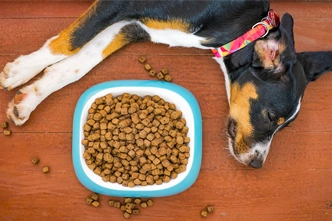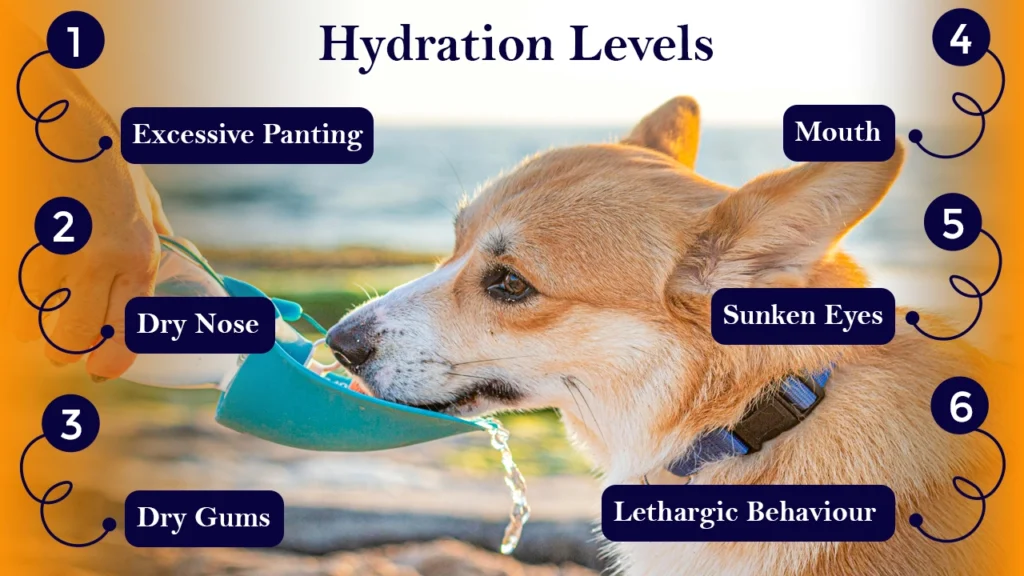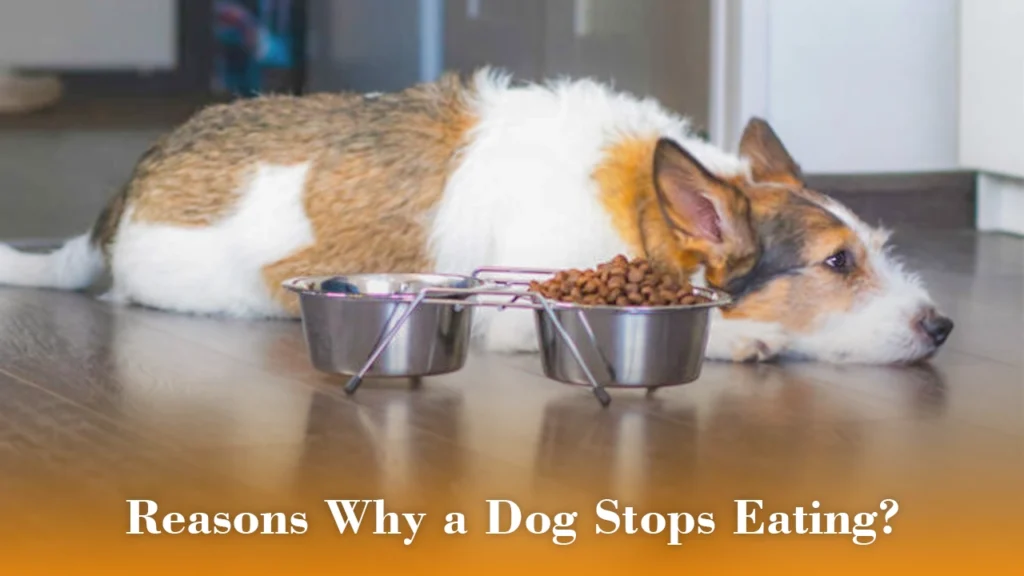
How Long Can Dogs Go Without Food | 5 Vet Approved Reasons & Facts
As a pet parent, it’s normal to be concerned if your dog hasn’t been eating well for the time being. Well-balanced and regular meals are crucial to keep your dog’s healthy and fresh. The only time a dog can go without food is before medical procedures and, that too, on the vet’s instructions. That is because consistent starvation can lead to an emergency really quickly.
Although the pup refuses to eat occasionally, being a pet owner, it is essential to know why your dog is consistently rejecting the food you present to feed. In this blog by Pet Life Expert, we will discuss how long can a dog go without food, why your dog won’t eat and relevant concerns to help you to keep your pup healthy and fresh for a long time.
Note:
The bearing capacity of dogs can vary from one to another dog breed in terms of dietary needs. Depending on the dog breed, they must not be left out without eating for more than 2-3 days. If a dog won’t eat for 2 days, it is a point of concern which must be instantly consulted with veterinarian.

Critical Factors That Impact a Dog’s Ability to Go Without Food
Your dog skipping meals for a long time is something actually to be concerned about as a pet owner. Like humans, often dogs also go through appetite fluctuation phases. That’s why we’ve mentioned some risk factors for your help.
1. Health Conditions
The health condition of your dog strongly impacts their appetite, particularly, when your dog is unwell due to surgery, or has diseases like cancer or diabetes. You should consult your vet instantly.
2. Smaller Breeds
Small dog breeds have a faster metabolism than large ones. Hence, they burn calories faster. As a result, skipping a meal or two can cause lethargy, seizure, and shaking.
3. Hydration Levels
Your pup can go without food but not water because keeping them hydrated is crucial for their well-being and activity. Excessive panting, dry nose, dry gums or mouth, lethargic behavior, and sunken eyes are some dehydration signs.

4. Older or Younger
When it comes to older or younger breeds, the timeframe can vary. You must consult a vet if your puppy hasn’t eaten for 24 hours, an adult dog hasn’t eaten for 24-48 hours, and when senior dogs skip one or two meals, go to the vet right away.
How Long Can a Dog Survive Without Food? Explained
Are you concerned how long a dog survive without eating food? or why my dog not eating? well, A healthy dog can typically go 5 to 7 days without eating. However, a number of factors, including age, size, health, and degree of hydration, can impact this. Even while they might physically make it through this time, prolonged fasting could result in serious negative health effects.
What Occurs When Dogs Go Without Food for Long?
Understanding how long can dog go without food an water involves assessing certain situations given below.
Early Stages
In the first 24-48 hours of meal skipping, most dogs experience lethargy, fatigue, and little irritation. To keep functioning, the pet’s body utilizes stored energy from glycogen and fat.
Prolonged Starvation
When starvation is prolonged, dogs might lose weight, get weak, and decline organ functioning. Other symptoms include restlessness, depression, and anxiety.
What are the Reasons Why a Dog Stops Eating?
Besides knowing, how long can dogs go without eating, it is essential to know the reasons behind puppies and dogs skipping meals.

1- Environmental Changes
Sometimes, sudden shifts in routine, environment, and feeding times can make a pup hesitant to eat their food.
2- Illness or Injury
Sometimes specific health issues like injuries and gastrointestinal pain can result in appetite loss in your pup.
3- Psychological Issues
Other psychological issues can make dogs lose interest in food like anxiety, stress, and depression, triggering their emotions.
4- Dental Problems
Teeth or gum disease causes significant pain and disturbance, causing puppies to lose interest in food intake.
5- Medication Side Effects
When your pup is recovering from any illness or surgery, it won’t help but refuse to eat anything for the time being.
How to Handle It When Your Dog Stops Eating?
Before knowing more on how long can a dog go without food, it’s essential to understand how to tackle the situation. Every dog has a unique set of dietary requirements based on their body weight, age, lifestyle, and overall health. The following advice will assist you in monitoring your dog’s daily food intake.
1- Monitor Their Behavior
Noticing their behaviour like changes in energy levels and other symptoms like diarrhea and vomiting.
2- Assess Dog’s Daily Calorie Intake
The number of calories your dog should take can be determined by a veterinarian to help you know their needs.
3- Weigh Out Your Dog’s Food
Weigh your dog’s food using a kitchen scale rather than scooping it out with a measuring cup to know the exact serving amounts.
4- Check for Malnutrition Signs
Examine the aforementioned signs of malnutrition and keep a close eye on your dog’s BCS for any significant alterations.
5- Consult Your Veterinarian
When a dog doesn’t eat for more than 24 hours, it’s time to consult your vet to address the issue so that you can prevent complications.
How to Motivate a Dog to Eat Food?
It is important to know the encouraging tips to pamper a dog for eating besides knowing how long can dogs go without food.
Adjust Their Diet
Balance their diet by offering more enticing food varieties like boiled chicken, rice, and wet food. This way, you can slowly back them up to their regular diet. Some other safe food alternatives are:
- Cooked chicken or scrambled eggs.
- Low-sodium chicken broth
- Canned pumpkin (unsweetened)
Create a Comfortable Feeding Environment
Creating a calm atmosphere with no distractions can encourage your dog to eat. Be consistent with their mealtime to feed them stress-free.

Avoiding Feeding Problems in Future
When it comes to the assessment of how long can a dog go without food and water, it is essential to follow these tips.
Regular Vet Check-Ups
Go for routine checks to have the health record of your pet. These check-ups will help you know the addressable potential issues before they affect your pup’s appetite.
Maintain a Feeding Schedule
Establishing a consistent feeding schedule is the strategy to prevent eating habits, ensure proper nutrition and have a balanced routine.
Tips To Keep Your Dog on a Feeding Schedule
Pets love routines, and setting a proper mealtime can track your pet’s eating habits. Try these tips to stick to a consistent feeding schedule.
- Set reminders on your phone.
- Try an automatic feeder.
- Portion out food ahead of time.
- Subscribe to a pet food delivery service that offers pre-portioned meals.
- Hire a sitter for drop-in visits if you have to leave early or stay out late.
When to See a Vet?
Pet owners looking for facts on how long can dogs go without food must be eager to know when to consult a vet. So, it is advised to see a veterinarian right once if your dog has not eaten in more than 24 to 48 hours or exhibits further symptoms including diarrhea, vomiting, or lethargy. These symptoms could point to a dangerous underlying illness, like intestinal obstructions or organ failure.
Final Thoughts
Understanding how long can dogs go without meal, and the reasons behind appetite loss is crucial for anyone owning a dog. By staying observant and proactive, you can address feeding issues early and keep your furry companion healthy and happy. It is highly important for a pet owner to understand the dietary needs of a dog to give meals according to their requirements. However, you must not let them starve for more than 2 days because it could lead to health complications. Make sure to see your veterinarian as soon as you notice appetite loss in your dogs.
FAQs | Frequently Asked Questions
How Long a Dog Can Stay Without Eating?
Well, the time span for a dog without food can vary based on health, size, and age. However, a healthy dog can stay for around 5-7 days without eating.
Is Skipping Meals Occasionally Okay for a Dog?
Yes! Dogs occasionally skipping meals is okay, but it’s not a good sign when it happens consistently, and it is advised to consult a vet immediately.
Can Dehydration Possibly Be the Reason of Dog Not Eating?
Absolutely! Dehydration can make a dog lose its appetite and result in lethargy as well. Staying hydrated is the solution to go for it.
Is Force-Feed Okay When My Dog Refuse To Eat?
No! It is not recommended to force-feed your dog because it can cause stress. In this case, you can seek vet assistance for guidance.
How Long Dogs Can Go Without Water?
Dehydration in dogs can only stays for about 72 hours, but you’ll notice symptoms after 24 hours. You should not keep your dog dehydrated for long though.
Can a Dog Go Entire Week Without food?
An adult and healthy dog can survive typically survive about 3 to 5 days without food, but they will still need access to water. However, some dogs might even survive without food for a week, but they’ll become week and might suffer from several health issues.
How Long Can a Dog Go Without Food Before Dying?
While a healthy dog is drinking water, it can survive for 3 to 5 days without food. However, it is not advised to contact a veterinarian if your dog won’t eat for two days but it could lead to health complications.



